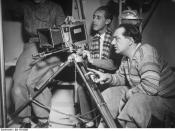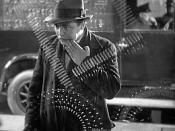Carlos Rocha ENG 3307.1 Breathless Group 10/14/2010
Injustice in Fritz Lang's "Kangaroo Court"
In 1931, Germany was undergoing the rise of Hitler. Anti-Semitic propaganda was becoming rampant, and a string of serial killers were on the loose. One of these serial killers was Peter Kürten, a man who was later deemed to have been mentally unstable after being sentenced to death. Indeed, Fritz Lang's film M "takes on a powerful subtext when you look at [it] as a product of its time and place" (Ashlin). Lang's attempts to communicate a message of injustice reflect his distrust for the German state during the era leading up to the Holocaust. Nowhere is this most evident than in the scene of Hans Beckert's final fate at the hands of the city's criminals and their "kangaroo court".
It is not surprising that M carries a veiled message of injustice. Fritz Lang and Peter Lorre (who plays the murderer) were both Jewish Germans living under the rule of the Nazi party.
Excerpts of Jewish actor Peter Lorre's character admitting to murder in M were even used out of context in the Nazi propaganda film The Eternal Jew. Moreover, famous serial killer trials like Peter Kürten's and Fritz Haarman's trials in the late 1920s and early 1930s brought to public attention the death penalty and judicial practices dealing with mentally ill offenders. It is widely accepted that M began Lang's advocacy against the death penalty.
The theme of irony is used in this film to describe the irrationality of injustice. The court of criminals prosecuting a self-declared compulsive killer is one of the ways Fritz Lang conveys irony in M. The courtroom's mise-en-scene paints a different picture of justice in this movie. When the characters enter the courtroom, they must walk down a...


